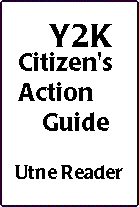
nside the current issue of Utne Reader is a copy of Y2K Citizen's
Action Guide. This 120-page book offers an overview of the Y2K computer
problem and illustrates the need to work together toward various forms
of preparedness--from inner to household, from neighborhood to community
readiness. The booklet can be ordered directly through your local bookstore,
or via the Internet at www.utne.com/y2k.
If you think Y2K will not affect you because
you don't have a computer, think again. When the time code on some 20 to
60 billion embedded computer microchips turns to 1/1/2000, an estimated
5% of these chips are expected to malfunction, but no one knows which 5%
will fail. Programmed to operate on a time-based code reading the last
two digits of the century, these chips will turn back to the year 1900,
which will cause inevitable malfunctions, shutdowns and crashes.
Many experts admit that there
is neither the time nor the personnel to address and repair the defective
code on date-sensitive microchips. The situation is, as Larry Shook says,
a big, simple problem. It's like giving a person a shoebox full of marbles
to polish by Tuesday. That's easy. Now give them the Grand Canyon full
of marbles to polish, and you have Y2K.
It's ironic that this inevitable
catastrophe is an implanted computer error rather than, say, an alien invasion
or genetic technology run amok. It's like the global mind reading itself
in advance, and planting a seed that gives us all a year to get it together
or lose it in an an apocalyptic fiasco that could be prevented.
Some reports predict only minor
setbacks. But Eric Utne, in a piece called "I Am Because We Are," expects
Y2K to be "the social equivalent of a worldwide earthquake." We know where
and when, but we can't tell whether our computer-dependent world will merely
hiccup or it will be a cataclysmic event with millions, even billions,
suffering globally in its wake. Senator Robert Bennett, chairman of the
Senate's Special Committee on the Year 2000 Problem says, "Pay attention
to the things that are vulnerable in your life, and make contingency plans."
On a global scale, nuclear power
plants, ultra-toxic chemical and weapons development plants, public utilities,
communication systems, the banking system, transportation, medical services,
oil drilling, and virtually all micro-computer driven instruments from
watches to elevators are vulnerable. Charles R. Halpern writes, "We have
created a world in which every system is six software programs or microchips
removed from every other system." If one computer goes down that is connected
to or supports another system, the other systems fail as well. We will
see how interconnected we really are, and how everyone else's problems
are our own. He suggests pressing businesses and governments for more openness
about Y2K compliance efforts.
Breakdowns of life-preservation
systems, from hospitals to pharmaceuticals to infrastructure components
like ambulances and fire-fighting, will be affected. Halpern suggests contingency
plans based on worst-case scenarios--such as setting up emergency relief
centers in churches, synagogues, schools and other local institutions.
In addition to helping each other
we must minimize the risk of civil disorder and resist thinking in isolationist
terms. Rather than operate under an "us versus them" mentality, we are
encouraged to take personal and local responsibility by alerting our friends
and neighbors and coming together to develop community strategies.
According to Margaret Wheatley
and Myron Kellner-Rogers, the question we should be asking ourselves is
not, "What's wrong and how can I fix it?" We should be asking instead,
"What's worth sustaining? What's possible, and who cares?" We want to "avoid
attempts to patch together the old system, or to frantically re-create
systems that have resulted in isolation and dissatisfaction." One author
remarked, "It's like returning to the days of the horse and buggy, only
without the horse and buggy."
According to Larry Shook, co-author
of Awakening: The Up Side of Y2K (see Sojourn's 1999 Directory,
p. 31) the dilemma is ambiguous. Is Y2K the millennium bug or a bomb? He
quotes Jim Lord: "There are two kinds of people: those who don't think
Y2K is a problem, and those who work on Y2K and are terrified."
Steve Davis, budget manager for
the city of Montgomery, Alabama, said, "I have a standing answer for any
public official who says he doesn't have a Y2K problem: Show me your report."
Any claim other than a methodical inventory analysis is meaningless.
The Cassandra Project (Cassandra being the tragic Greek
heroine who accurately prophesied doom but was ignored) is now a national
clearinghouse for personal and community Y2K preparedness. Its website
is http://millennia-bcs.com/casframe.htm.
Y2K Citizen's Action Guide
provides personal inventory and neighborhood survey forms and personal
preparedness checklists (for both outer and inner resources). Its finishing
touch is its appendices, which include a thorough resource guide, recommendations
by the U.S. Committee on Government Reform and Oversight, and proposed
legislation to protect citizens' credit, property and health, and to provide
incentives for education and readiness.
Single copies of Y2K Citizen's Action
Guide can be purchased for $4.95 US at bookstores. Community preparedness
groups are encouraged to purchase and resell copies as a means to raise
funds for their efforts. Bulk orders (in increments of 50 copies) can be
made by sending $1.00 per book (plus $7.50 per 50 copies for shipping
and handling). Send check or money order, payable to Y2K-Utne, to: Bulk
Order, Utne Reader, 1624 Harmon Place, Minneapolis, Minnesota 55403
USA. Reviewed by Liz Haapanen.
Ain't
I A Woman? ~ Cover Artist: Joanie Mitchell
Dreamstream ~From the Publishers ~ Public
Service
Voice of the Infinite in the
Small ~ Welfare Reform
Wild2K ~ Y2K
Citizen's Action Guide
Y2K Task Forces in Rural
Northern California
All Rights Reserved. Copyright © 1999 Sojourn Magazine


